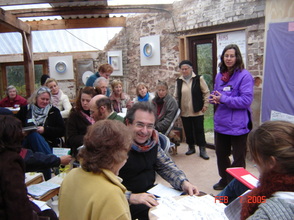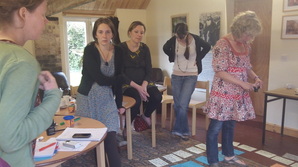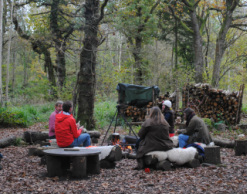"Firstly, I just want to say a big thank you because you are really good at your job! We are a very diverse team and you facilitated our session so well, bringing clarity where there was confusion. I love the way you enable us to have honest and open conversations about difficult subjects without arguments or ill-feeling ensuing. That is a skill that few have.
The moment I walked in the room and realised that your were our facilitator, I was able to relax knowing we were in a safe space.
Every time we have had a session with you I feel that we are more bonded as a team and we know each other better.
I look forward to the next time we work together"
Torbay Community Development Trust Worker
What is facilitation?

planning events
In group work, the facilitator works with a group of people to help them have a conversation, come to agreement, or plan for the future. In general the facilitator acts as a trusted and neutral outside voice, making decisions about the process the group goes through and allowing the group to focus on and control the content of the discussion. The facilitator is a gentle guide, making it easier for the group to have the discussion, to make agreements, to find consensus.
My approach is based on the adaptable four-step model developed by the Institute of Cultural Affairs, which allows for both linear and creative thinking and encourages many levels of group discussion. Importantly, it leads to both individual and group decision-making that is rooted in reality.
We can work indoors or outdoors...being in nature can take a process deeper or make it easier to talk through the tricky issues. My love is to take the work outside and work with nature as a guide to help with discussions; to use natural metaphors to illuminate group processes and find answers. When we work outdoors, my skills in bushcraft and knowledge of natural systems become a useful springboard for learning.
My approach is based on the adaptable four-step model developed by the Institute of Cultural Affairs, which allows for both linear and creative thinking and encourages many levels of group discussion. Importantly, it leads to both individual and group decision-making that is rooted in reality.
We can work indoors or outdoors...being in nature can take a process deeper or make it easier to talk through the tricky issues. My love is to take the work outside and work with nature as a guide to help with discussions; to use natural metaphors to illuminate group processes and find answers. When we work outdoors, my skills in bushcraft and knowledge of natural systems become a useful springboard for learning.
How can it help?

sharing ideas
- Having someone external plan the process for a meeting or event often makes it a lot more productive and effective.
- A skilled facilitator can 'hold' a meeting together, keep everyone to the schedule, making sure all voices are heard and that aims are achieved, even whilst the difficult discussions happen.
- Having a person from outside come and lead a session can help change the culture that has previously been established in a group, so it's a good way of making changes when meetings are not working.
-With more than twenty years as a facilitator, I have many tools to draw upon and useful experiences to share
- A skilled facilitator can 'hold' a meeting together, keep everyone to the schedule, making sure all voices are heard and that aims are achieved, even whilst the difficult discussions happen.
- Having a person from outside come and lead a session can help change the culture that has previously been established in a group, so it's a good way of making changes when meetings are not working.
-With more than twenty years as a facilitator, I have many tools to draw upon and useful experiences to share
For groups that work

woodland meeting space
Designed and Facilitated one day or half day sessions - for working through issues, coming to decisions where consensus is needed, planning collective projects. These days have been recently been used for planning collaborative funding bids, coming up with branding ideas and designing new ways of organisational working.
Facilitated Team days - for creating the space for new discussions, dealing with tricky issues or simple thinking space away from the everyday.
Training in Facilitation and Group-work skills - using the four-step model, the Group Facilitation Methods course is suitable for many situations. It can be run locally or find a public course being run by ICA:UK. here. Alternatively, a course can be designed to suit your needs.
Facilitated Team days - for creating the space for new discussions, dealing with tricky issues or simple thinking space away from the everyday.
Training in Facilitation and Group-work skills - using the four-step model, the Group Facilitation Methods course is suitable for many situations. It can be run locally or find a public course being run by ICA:UK. here. Alternatively, a course can be designed to suit your needs.

